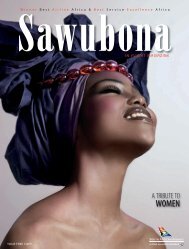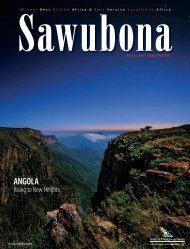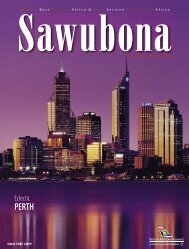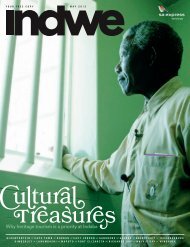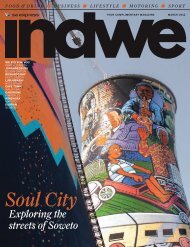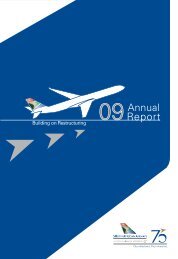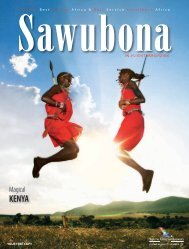Lesego Malatsi - SouthAfrica.TO
Lesego Malatsi - SouthAfrica.TO
Lesego Malatsi - SouthAfrica.TO
You also want an ePaper? Increase the reach of your titles
YUMPU automatically turns print PDFs into web optimized ePapers that Google loves.
THE GREAT and the good of the<br />
business world recently gathered<br />
at The Grand Connaught Rooms in<br />
London at an Economist Conference<br />
entitled ‘The High-Growth Markets<br />
Summit – The World of Opportunity.’<br />
The term ‘high-growth markets’ is<br />
now considered the ‘PC’ term for<br />
‘emerging markets’. Amid heated<br />
debates and divided opinions,<br />
Africa featured high on the agenda.<br />
A number of high profile business<br />
leaders including Strive Masiyiwa,<br />
founder and chief executive officer<br />
of Econet Wireless Holdings,<br />
Frank Braeken, Unilever executive<br />
vice-president for North Africa,<br />
Middle East and Central Africa<br />
and Ncube Mthuli of the African<br />
Development Bank debated the<br />
prospects for the continent.<br />
They identified a number of key<br />
themes driving Africa’s place in the<br />
world’s rising high growth markets.<br />
Beyond natural resources<br />
Africa is no longer a resources<br />
story. Rapidly rising income<br />
is pushing up the potential for<br />
consumption in Africa with a very<br />
large emerging consumer base<br />
across the continent. This, say the<br />
experts, is providing some very<br />
interesting investment opportunities<br />
in under-researched and generally<br />
poorly understood markets.<br />
Frank Braeken of Unilever<br />
commented: “There is a growing<br />
realisation that the future of Africa is<br />
based around a consumer rather than<br />
mining. This is a consumer that has<br />
been under-served and over-charged.<br />
“It is very ironic that the African<br />
consumer pays more for consumer<br />
products than any other – toothpaste<br />
and washing powder are twice more<br />
expensive than in Asia, telecoms<br />
space consumers are overcharged<br />
and to build a house on the continent<br />
is more expensive than in China.”<br />
But with incomes growing<br />
consistently, the continent’s<br />
emerging middle class provides<br />
new oppurtinities for both domestic<br />
and international business to<br />
grow – and increasingly the world<br />
is sitting up and taking notice.<br />
Improving democracy<br />
Africa has witnessed a sea change in<br />
politics in the last 25 years. In 1985,<br />
84 per cent of the continent belonged<br />
to one-party states/dictatorships.<br />
Today, more than 90 per cent are<br />
multi-party democracies, which<br />
means more accountable government<br />
and much less war and civil unrest.<br />
Of course there have been the<br />
uprisings across North Africa but<br />
these have essentially been driven<br />
by the citizens of these countries<br />
pursuing democracy and a free<br />
future. Peaceful democratic transfer<br />
of power is becoming the norm<br />
even though violence makes better<br />
copy. So while Ivory Coast's bloody<br />
post-election standoff was headline<br />
news, the elections in Nigeria,<br />
widely praised as the fairest in<br />
decades, attracted far less attention.<br />
Strive Masiyiwa of Econet Wireless<br />
Holdings said: “When Mandela came<br />
out of prison only 7 countries out<br />
of 54 held democratic elections. By<br />
2006 only seven countries where not<br />
holding democratic elections – most of<br />
these were North Africa and now we<br />
have the Arab uprising to answer for<br />
this.” He added that Nigeria – which<br />
accounts for a large part of Africa's<br />
population – has not witnessed a<br />
military coup for the last 15 years.<br />
Urbanisation & demographics<br />
Africa is now nearly as urbanised<br />
as China, with the continent's<br />
cities growing faster than Asia’s.<br />
Urbanisation drives accessibility<br />
and analysts see this as a positive<br />
although Braeken maintains that<br />
the biggest caveat remains the<br />
affordability of consumer goods.<br />
“Businesses expect much<br />
higher yields to compensate for<br />
the risk of operating in Africa<br />
but this will not be sustainable<br />
over the long term,” he said.<br />
Beyond urbanisation another<br />
factor playing in Africa’s favour is<br />
its fantastic demographic profile<br />
- around half of the continent's<br />
billion-strong population is of<br />
working age. This is a huge contrast<br />
to European countries, Japan and<br />
even China, whose one-child policy<br />
is storing up demographic trouble.<br />
Africa’s labour force is expected to<br />
more than double by 2040, keeping<br />
its dependency ratio low and<br />
ensuring that the various age-related<br />
concerns prevalent in the West will<br />
not be a problem for years to come.<br />
The power of the diaspora<br />
While poverty is still endemic, the<br />
continent enjoys huge private capital<br />
flows back thanks to many expatriates<br />
from Africa working abroad. Where<br />
the continent was once an exporter<br />
of capital and intellectuals, many<br />
of these individuals are to return<br />
to Africa and are improving the<br />
quality of management teams. Many<br />
CEOs of companies are Harvard/<br />
Oxford educated, improving<br />
levels of corporate governance.<br />
“We should not underestimate the<br />
impact of the diaspora,” said Ncube<br />
Mthuli of the African Development<br />
Bank, pointing out that the amount<br />
of capital flowing into the continent<br />
from expatriates is equivalent<br />
to Aid received (around US$45<br />
million) but the difference is that<br />
this is targeted money whereas<br />
Aid can be “all over the place”.<br />
But as Strive Masiyiwa said: “I<br />
love the money from Diaspora – but<br />
I would rather they came home.”<br />
Better leadership<br />
Linked to diaspora is the emergence<br />
of what the panel of experts dubbed<br />
a ‘new kind of leadership’ on the<br />
continent. “African expatriates<br />
going back are bringing a new<br />
quality of leadership to the<br />
continent,” said Mthuli. Braeken<br />
said Rwanda is a good example<br />
INDWE NOVEMBER 2011 41



